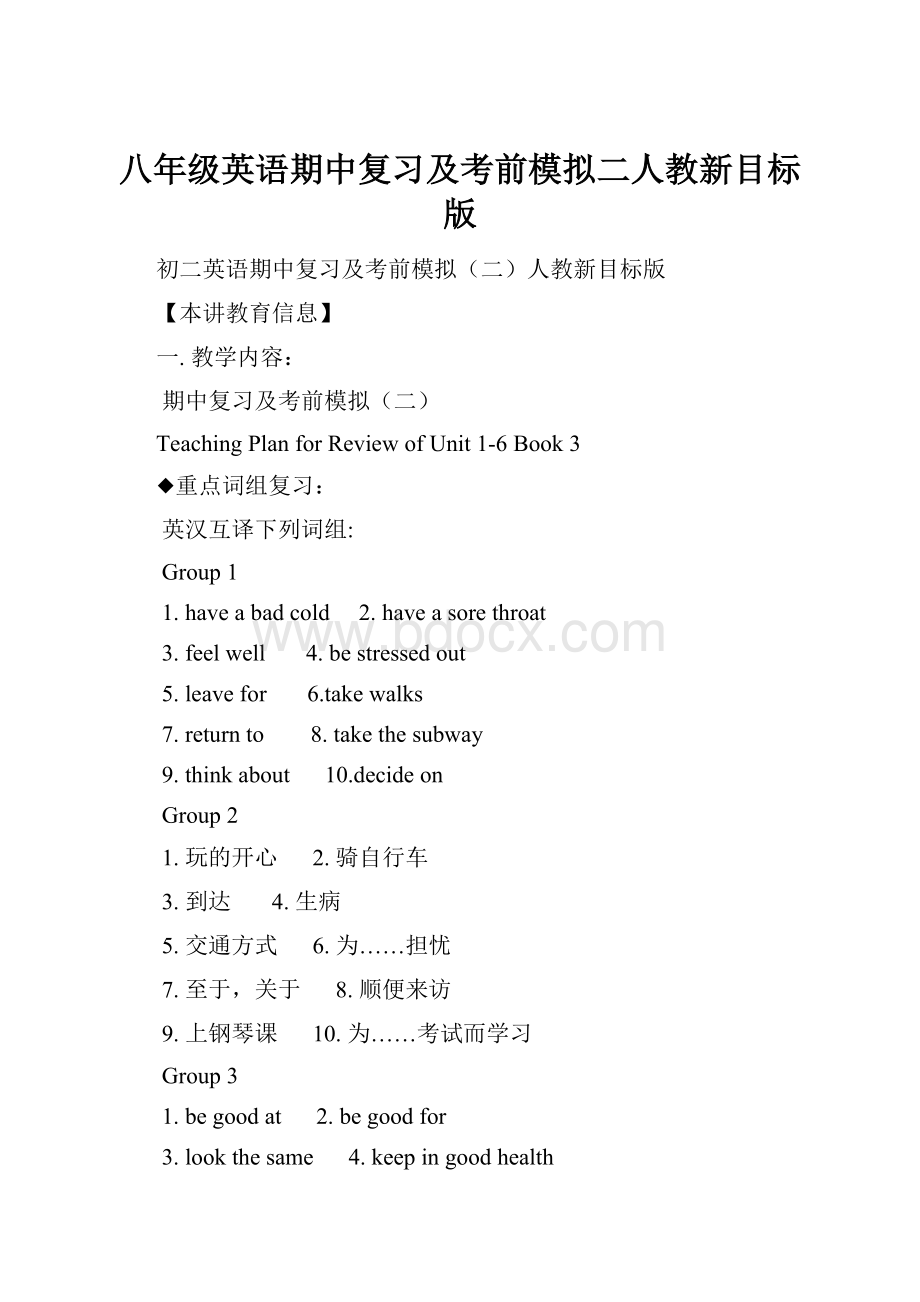八年级英语期中复习及考前模拟二人教新目标版Word文档下载推荐.docx
《八年级英语期中复习及考前模拟二人教新目标版Word文档下载推荐.docx》由会员分享,可在线阅读,更多相关《八年级英语期中复习及考前模拟二人教新目标版Word文档下载推荐.docx(27页珍藏版)》请在冰豆网上搜索。

He’llcomebackinthreedays.→Howsoonwillhecomeback?
2.howoften表示“多久一次,是否经常”的意思,指频率。
Howoftendoyoutakeashower?
常对sometimes,usually,everyday等表示频度的副词或词组提问。
Hewritestohisfatheronceamonth.→Howoftendoeshewritetohisfather?
3.howlong表示“多长时间、多久”,指时间。
Howlongwillyoustayhere?
用来对句中带有for,until等表示一段时间的状语提问。
对某些动词(take,spend等)后面表示时段的名词提问时也用howlong。
JimhaslivedinHongKongforovertenyears.→HowlonghasJimlivedinHongKong?
4.howfar表示“多远”的意思,指距离。
Howfaristhebusstationfromhere?
考点透视:
中考原题
1.—didthemeetinglast?
—Abouthalfanhour.
A.HowsoonB.HowlongC.HowfarD.Howmuch
2.—willthebridgebefinished?
—Inafewmonths.
A.HowsoonB.HowlongC.HowoftenD.Howfar
考题解析:
Howlong意为“多长时间”,多用于对(for)+时间段的提问;
howsoon意为“多久以后”,多用于对in+时间段的提问(以现在的时间为起点);
howoften意为“每隔多久”,多用于对频率的提问;
根据各题答语,题1对时间段提问,选B;
题2对in短语提问,选A。
Exercises:
选择填空
1)How_____doyouseeamovie?
A.longB.oftentimeC.longtimeD.often
2)How______willtheybeback?
A.soonB.longC.oftenD.short
3)How_____isthesubwaystationtotheairport?
A.longB.farC.soonD.often
▲频率副词
说起“频率副词”,你可能不太了解。
谈起often,always,usually,sometimes,你一定会脱口而出,它们是一般现在时的“标志词”。
它们是表示频率的副词。
这些词表示经常性动作或情况,不是某一具体动作,常用于一般现在时。
这些频率副词在句子中的位置比较灵活,可以用于句首、句中和句末。
在句中的位置一般在系动词be,情态动词(can,may,must等)或助动词(do,does等)之后,行为动词之前。
这些频率副词在表示动作发生的频率时,程度上有所不同,从频率由高到低依次顺序是:
always→usually→often→sometimes→seldom→hardlyever→never
总是通常经常有时很少几乎不从不
1)always意为“总是,一直”。
是频率最大的,表示动作重复,状态继续,中间没有间断。
如:
Maryisalwayslateforschool.玛丽总是上学迟到。
2)usually意为“通常”,表示习惯动作,频率仅次于always,相当于most。
表示除个别情况外,基本上没有变化。
Heusuallygetsupat6o’clock.他通常6点钟起床。
3)often意为“时常,经常”,表示动作重复,中间有间断,表示发生的频率比usually要小,但比sometimes要大。
Ioftengotoschoolbybike,butsometimesIgotoschoolbybus.我经常骑自行车上学,但有时乘公共汽车去。
4)sometimes意为“有时”,表示发生的频率更小。
sometimes一词在书写时要十分小心,若分开写成sometimes就成了“好几次,数次”。
Hehaslunchinthefactorysometimes.他有时在工厂吃午饭。
Ireadthisstorysometimes.这个故事我读过好几次了。
5)seldom“很少”,比sometimes更少。
HeseldomwatchesTV.
6)hardlyever“几乎不”,接近于零的意思。
Shehardlyevergoesoutatnight.
7)never“从不”,其频率为0。
I’mneverlateforclass.
▲关于What'
sthematter的用法分析
What'
sthematter?
怎么了,发生什么(困扰/麻烦的)事了?
=What'
swrong?
What’sthetrouble?
用于询问某人发生什么事或遇到了什么麻烦。
Youlooksad.What'
他看上去很悲伤,怎么回事?
如后接人或物的名词或代词时,用What'
sthematterwithsb./sth.表示“某人/某事有什么麻烦啦?
”,相当于What'
swrongwithsb.。
sthematterwithyourbike?
你的自行车出什么故障了?
例题讲解:
A:
—________?
B:
—Nothingisthematterwithme.
A.What'
sthematterwithyouB.What'
swrongtoyou
C.WhatdoesthematterwithyouD.Whatmattertoyou
分析:
答句“Nothingisthematterwithme.”意为:
“我没事。
”,故答案是A。
matter作动词、名词的用法
Itdoesn'
tmatterthistime.这次没有关系。
matter在这里作动词,意为“要紧”。
Itmattersverylittle.不要紧,丝毫没关系。
tmatterwhowilldoit.谁干这事都无关紧要。
matter同时也可作名词,意为“事情,问题,麻烦事”。
sthematterwithyourleg?
你的腿怎么了?
▲介词on的用法
1.在星期的前面用on:
onMonday/Tuesday/Wednesday/Thursday/Friday/Saturday/Sunday
2.在星期的上、下午、晚上前面用on
onSaturdaymorning/onSundayafternoon/onFridayevening/onMondaynight
3.在节日的前面用on
onMayDayonChristmasDayonNewyear’sDayonTeachers’Day
4.在月日的前面用on
onOctober31onNovember2nd
5.在年月日的前面用on
onNovember3,2006onDecember12th
6.在某个特定的日子前面用on
onahumidsummerdayonadrycoldwinterafternoon
onthemorningofMay28,2006
▲现在进行时的用法
口诀巧记两种时态
我们在初一已经学过“一般现在时”和“现在进行时”两种时态,你掌握得怎么样?
下面的两则口诀将帮你们巩固它们。
口诀一:
一般现在时
一般现在时态中,动词一般用原形。
表述事实讲真理,习惯动作常发生。
动词词尾加-s(es),只表单数三人称。
若变一般疑问句,得看句型是哪种。
系表结构和therebe,be放句首可完成;
若遇实义动词句,do或does莫忘用!
口诀二:
现在进行时
Look,Listen是标志,现在进行正发生;
有时now在句中现,“be+v-ing”时态成。
若问be用何形式,须看主语数、人称。
He/Sheis,Iam.We,you,they后are紧跟。
v-ing形式更好记,三种构成要分清。
一般问句be提前,be后加not否定成!
现在进行时:
(1)表示说话时正在进行的动作。
1)YouarehavinganEnglishlecturenow/atpresent.
2)Whatishedoing?
Heisreadingamagazineinthelivingroom.
3)Listen!
Somebodyisplayingtheviolininthenextroom.
4)Look!
Theyaretalkinginalowvoice,insteadoflistening.
(2)表示现阶段正在进行的动作。
1)Wearereviewingourlessonsthesedays.
2)Mymotheristeachingmathinajuniorschool.
(3)某些动词用于进行时,不表示进行而表示将来。
1)Whenaretheygoing?
Theyaregoingnextweek.(seeUnit3)
2)IsJackieleavingnextweek?
3)Heisstayinghereforamonth.
注意这类动词有:
come,go,leave,start,arrive,stay。
这类动词上述用法要带一个表示将来的时间状语。
例如:
1)He’scomingbacknextweekend.
2)ThetrainisleavingforShanghaiintenminutes.十分钟后火车将开往上海。
一般现在时和现在进行时的区别:
(一)概念不同
1.一般现在时表示经常的、习惯性的动作或存在的状态;
也表示说话者的态度、能力或自然现象等等。
Heoftenhelpsothers.
IcansinginEnglish.
Theearthgoesroundthesun.
2.现在进行时表示说话时正在进行的动作,或现阶段一直进行的动作。
Heislisteningtotheteacher.
Heisgettingtallerandtaller.他越来越高。
(二)构成不同
1.一般现在时有以下几种结构。
(以肯定句为例)
①be动词型。
谓语动词只有系动词am,is或are。
Theyarestudents.Theyareinthesameclass.
②实义动词型。
谓语动词由实义动词的原形或第三人称单数形式构成。
Iusuallygetupathalfpastfiveinthemorning.
HeworksinaTVfactory.
③情态动词型。
谓语动词由“情态动词can/may/must+动词原形”构成。
Icantaketheseexercise-bookstotheclassroom.
④祈使句型。
祈使句开头的动词一律用动词原形。
Pleaselookattheblackboard.
Becareful,please.
2.现在进行时由“be动词am/is/are+v-ing”构成。
Iamtalking,whileyoulisteningtome.
Wearegoingoverourlessons.Youarestudyingveryhard.
(三)时间状语不同
1.与一般现在时连用的时间状语有:
often,usually,sometimes,always,ateighto’clock,inthemorning(afternoon,evening),onSunday,everyday(week,month,etc如:
Wealwayswalktoschool.
Theshopclosesatsevenintheevening.
ShewashesherclothesonSaturdays.
2.与现在进行时连用的时间状语有:
now,thesedays,thisweek等等。
SheisstudyingEnglishnow.
Thesedaystheyareflyingkites.
▲怎样回答Howdoyougettoschool?
一种是用by短语,如:
—Howdoyougettoschool?
—Iusuallygettoschoolbybus.
一种是用动词,如:
—Itakeabustoschool,orIwalktoschool.
1.表示“到达”的几个同义词:
getto/arriveat/arrivein/reach。
Example:
Igottotheairportat10o’clock.
Iarrivedattheairportat10o’clock.(arriveat后接小的地点)
Ireachedtheairportat10o’clock.(reach为及物动词,不需接介词)
IarrivedinJapanyesterdayevening.(arrivein后接大的地点)
Igothomeat11pmlastnight.(在副词前省略to)
gethome,到家gethere,到达这儿getthere,到达那里getback回来
▲take的用法
1)take/bring/carry的区别:
take拿走,携带,带去;
bring拿来,带来;
表示方向相反。
carry与take、bring不同,它没有方向性,表示“随身携带”的意思。
Pleasetakethesethingtoyourcousin,Jerry.(从说话所在地把人或物带走或拿走)
CanyoubringyourCDtoschooltomorrow?
(把某人或某物带来或拿来,到说话者所在地)
Healwayscarriesalotofcashwithhim.他总是随身携带大量现金。
2)take搭乘(交通工具)
Itookataxitothestation.
Let’stakethenexttraintoSydney.
3)take吃,喝,服用
Itooksomemedicineforthecold.
Heonlytooksomeporridgethismorning.
4)take花费,需要(时间)
Thebusrideusuallytakesabout2hours.
Howlongdoesittaketogotherebytrain?
5)take句型:
Ittakesb.sometimetodosth.(一般现在时)花费某人时间做什么
Ittooksb.sometimetodosth.(一般过去时)
Itwilltakesb.sometimetodosth.(一般将来时)
Examples:
Itusuallytakesustwentyminutestowalkfromhometoschool.
Ittookme2hourstodomyhomework.
Itwilltakethemhalfayeartobuildthehouse.
6)take词组:
takeawalk____________takearest_______________
takeabath____________takeapicture___________
takeatrip___________takealook_____________
7)take习惯用语:
takeiteasy放心,别着急takeoff脱下
takepartin参加,参与takeplace发生
taketheplaceof代替take–away外卖食物
8)take/spend/cost表示“花费”的区别:
a.Itooktenminutestoworkoutthemathproblem.(take的主语可是人也可是物)
=Ittookmetenminutestoworkoutthemathproblem.
b.Hespenttwohoursonhishomework.(spend只用人作主语)
Sheoftenspendsmuchmoneybuyingfashionclothes.
c.Itwillcostyou600yuantoflytoTibet.(cost只用物作主语,主要用于花钱)
▲go+动词-ing形式,表示从事运动和娱乐性的活动。
gocampinggohiking
gofishinggoshopping
goswimminggobikeriding
gosightseeinggoskating
Exercise:
1.今天天很热,我们下午去游泳,好吗?
It’sveryhottoday.Let’sgo__________thisafternoon,shallwe?
2.女人喜欢购物,而男人却喜欢爬山和钓鱼。
Womenlike_______,whilemenenjoygoingclimbingand_____.
▲should情态动词,“应该、应当”,表示“责任和义务”。
—Ihaveaheadache.—Youshouldliedownandrest.
—Hehasabackache.—Youshouldgotoseeadoctor
Youshouldn’teattoomuchicecream.
can表示“请求、许可”,意思是:
可以做……?
对问句CanIdo…?
的回答可以是:
Yes,youcan./No,youcan’t.
对问句Canyoudo…?
的回答可以是:
Ofcourse,I’dloveto./Sure,I’dliketo./Great!
I’dloveto.I’msorry,Ican’t./I’msorry.Ihaveto…,I’msorryI’mdoing…
can①表示请求:
“可不可以”
1)—CanIsmokehere?
—No,youcan’t.
2)—CanIuseyourtelephone?
—Yes,ofcourseyoucan.
can除了表示请求之外,
can②表示能力:
“能,会”;
CanyouspeakGerman?
can③表示推测:
“可能是,不可能”
Runningfastcanbebadforyourhealth.
Cani